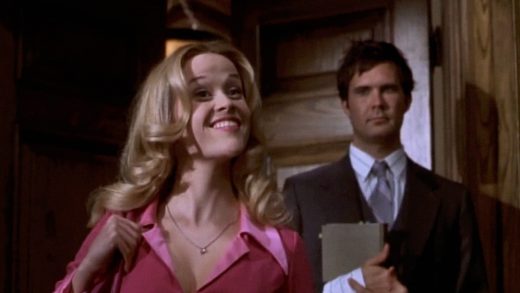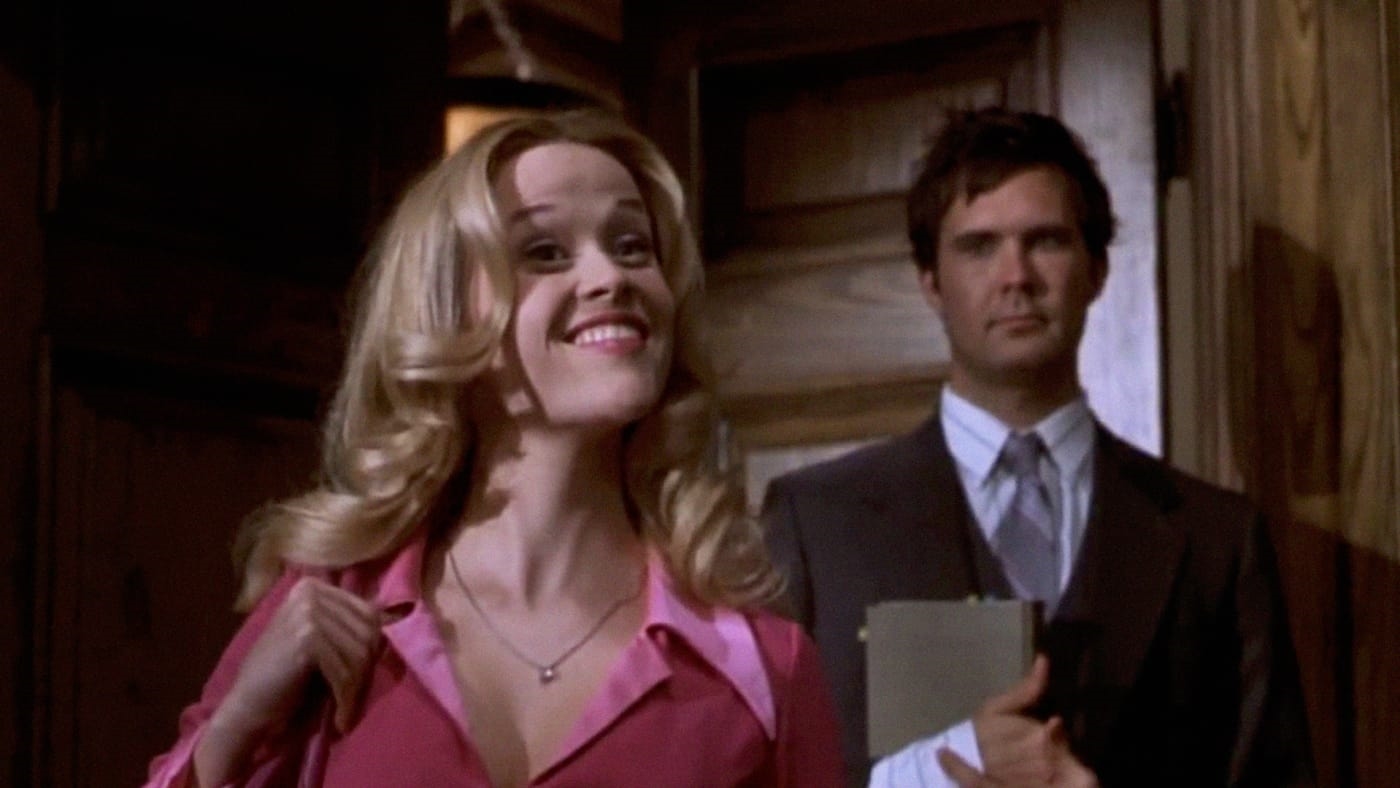Looking back at “Legally Blonde” as a proto-#MeToo manifesto
Last fall, Reese Witherspoon quickly joined the chorus of female celebrities sharing #MeToo stories in the aftermath of Harvey Weinstein’s unmasking.
“I’ve had multiple experiences of harassment and sexual assault, and I don’t speak about them very often,” the Fast Company cover star said during an Elle Women in Hollywood event last October. “But after hearing all the stories these past few days and hearing these brave women speak up tonight, the things that we’re kind of told to sweep under the rug and not talk about, it’s made me want to speak up and speak up loudly because I felt less alone this week than I’ve ever felt in my entire career.”
Witherspoon had already spoken up loudly through a character 17 years earlier–and probably made others in similar positions at the time feel less alone by doing so.
Like Witherspoon in real life, the plucky protagonist of Legally Blonde ultimately becomes a sexual harassment survivor in the movie. At that point, what had previously been a breezy (and breezily subversive) comedy suddenly morphs into a Trojan horse for a proto-#MeToo message, perfectly illustrating the insidiousness of workplace harassment and an idealized response to it.
Before I was blindsided by the film’s final third, what stood out most during a recent re-watch, prompted by the news of a forthcoming second sequel, is how well Legally Blonde holds up. (Witherspoon’s other hit from around this time, Election, is similarly sturdy.) The story of a jilted sorority queen following her ex to Harvard Law in an effort to win him back respects its lead character so much that the audience can only follow suit, even nearly two decades later.
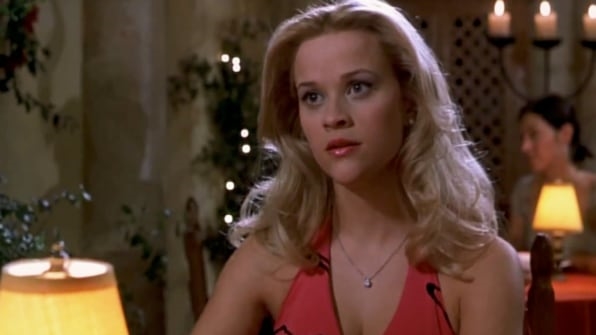
Elle Woods is the most confident, capable person onscreen throughout the movie. She carries herself in a way that suggests she’s unaware of what anyone thinks about her, although it’s far more likely she knows and just doesn’t care. Her actions demand to be taken seriously, even as her bright and bubbly blondeness leads many in the film to do the opposite. (Always at their peril.) Early on, WASP-y law student Vivian Kensington (Selma Blair), who is now dating our hero’s ex, invites Elle to a costume party. When she shows up to what is definitely not a costume party dressed as a Playboy Bunny, Elle rides out her forced error unflappably, dishing out a devastating off-the-cuff comeback to her tormentor in the process. (“I like your outfit too, but when I dress up as a Frigid Bitch I try not to look so constipated.”) Clearly, this is a woman who is used to being underestimated and resourceful at turning it to her advantage.
At the beginning of the third act, the film suddenly plunges into darker territory–and no, that’s not a reference to hair color. Before we move on, I should add I’m fully aware that a straight white man is not an ideal vessel for opinions on this film’s newly heightened relevance. However, I’ve been tracking and contextualizing the #MeToo movement extensively, and while I may never know what this kind of abuse feels like, I at least have a strong understanding of what it looks like and what enables it. Moving on . . .
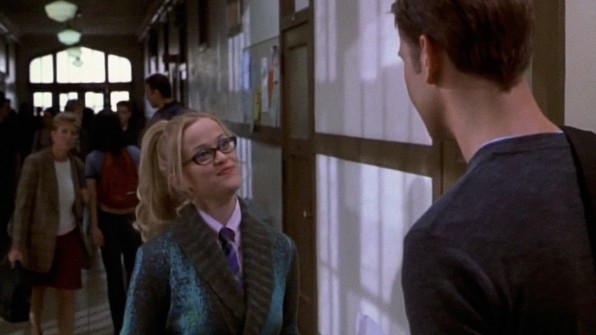
Although Elle Woods has a rocky start at Harvard Law, she ends up impressing the esteemed Professor Callahan (Victor Garber) into giving her an internship and working on a murder trial. After Elle demonstrates an impressive grasp of the case, the professor calls her into his office one afternoon and promises huge career opportunities ahead. Then he puts his hand on her leg.
The below exchange follows:
Elle Woods: Are you hitting on me?
Professor Callahan: You’re a beautiful girl.
Elle Woods: So everything you just said . . .
Professor Callahan: I’m a man who knows what he wants.
Elle Woods: And I’m a law student who just realized her professor is a pathetic asshole.
Although Elle not only fends off the professor’s advances and calls him an asshole to his face, she is utterly shaken. The professor’s scumbaggery makes her doubt everything about herself that the movie has spent an hour and change convincing us is magic. She’d put a lot of emotional stock into landing the internship and making headway in the trial, and in one moment all that progress was invalidated. Suddenly, the most confident, capable person in the world drops out of law school–embarrassed, ashamed, and plagued by a sneaking suspicion that all powerful men will ever see her as is a flaxen-haired sex object.
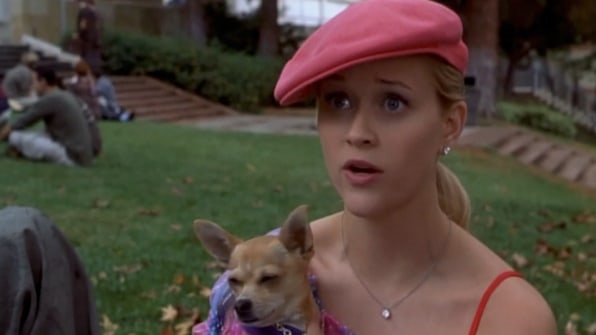
This moment reflects one of the most pernicious aspects of workplace sexual harassment, one that the #MeToo movement has highlighted: all the promising careers that never were. For every woman who’s been blacklisted for sexual noncompliance, there are many more who took themselves out of the equation early on because they were jaded by what they learned about How Things Are. Some of Weinstein’s targets simply decided to give up acting if it meant interacting with predators. These women weren’t quitters. They didn’t lack resiliency. They just hated the sum total of what they appeared to be worth to their industry.
Legally Blonde manages to get across the dramatic impact of such a scenario when Elle Woods drops out, but gives her the Hollywood ending that eluded so many women who actually worked in Hollywood. Although Vivian witnessed Callahan propositioning Elle and initially assumed she would go through with it, the hot Harvard Law associate played by Luke Wilson believes Elle and convinces Vivian too. Another professor (Holland Taylor) helps restore Elle’s confidence, making her reconsider quitting law school. The defendant in Callahan’s murder trial then fires the professor and installs Elle Woods as her lead defender instead. She wins the case. Hooray! Take that, patriarchy!
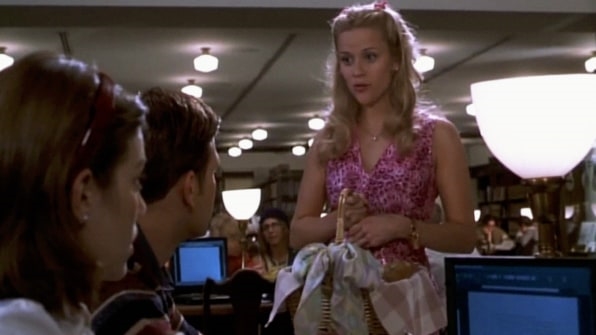
Elle believes in herself so much throughout most of the movie that what other people think of her never seems to matter, until it does. Toward the end, she needs other people to believe in her too for justice to prevail, a dynamic that foreshadows the wacky new trend of, you know, believing women. Luke Wilson’s character believes Elle, although hopefully not just because he thinks she’s a dime. (The pair eventually become a couple.) The fact that Vivian initially doesn’t believe Elle underscores how much skepticism has traditionally saddled the accuser in workplace harassment cases. Many of us have been conditioned to assume the more credentialed, tenured, respected person’s account is the one that matters most. It was an ingrained reaction powerful men relied on. But those days are now hopefully numbered.
As progressive as Legally Blonde’s sexual politics were 17 years ago, one aspect of the film’s #MeToo material that I hope we’ve left behind in 2001 is how unfazed Callahan is after hitting on Elle. His is the demeanor of a man who has behaved this way before and knows how it will shake out. He projects a stately calm–at least until he’s kicked off the case–and even then he doesn’t seem too worried about further repercussions. I’m not so naïve as to suggest that the problem of workplace sexual harassment has been resolved, but I do believe that in 2018, Professor Callahan would be absolutely scared shitless in this situation. The era of a bulletproof reputation rendering abusers more believable appears to be over. A 2018 Callahan wouldn’t be smiling like a supervillain after getting rebuffed; he’d be typing out sweaty, all-caps “WITCH HUNT!” tweets and transferring funds to the Cayman Islands.
Perhaps we’ll get a chance to see him, or someone similar, held to account in Legally Blonde 3.
Fast Company , Read Full Story
(30)

